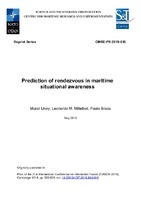| dc.contributor.author | Uney, Murat | |
| dc.contributor.author | Millefiori, Leonardo | |
| dc.contributor.author | Braca, Paolo | |
| dc.date.accessioned | 2019-06-18T12:25:34Z | |
| dc.date.available | 2019-06-18T12:25:34Z | |
| dc.date.issued | 2019/05 | |
| dc.identifier.govdoc | CMRE-PR-2019-035 | en_US |
| dc.identifier.uri | http://hdl.handle.net/20.500.12489/776 | |
| dc.description.abstract | In this work, we consider the problem of algorithmically predicting rendezvous among vessels based on their trajectory forecasts in a maritime environment. The problem is treated as hypothesis testing on the expected value of the distance between trajectories. We relate this quantity to the first and second degree Wasserstein distances between trajectory forecast distributions. These distributions are obtained using integrated Ornstein-Uhlenbeck process models with the trajectory measurements collected so far. Building upon these results, we propose an algorithm which traverses the trajectories observed so far for detecting rendezvous over a rolling time horizon. We demonstrate the efficacy of the proposed algorithm using simulations. | en_US |
| dc.format | 7 p. : ill. ; digital, PDF file | en_US |
| dc.language.iso | en | en_US |
| dc.publisher | CMRE | en_US |
| dc.source | In: Proceedings of the 21st International Conference on Information Fusion (FUSION 2018), Cambridge 2018, pp. 622-628, doi: 10.23919/ICIF.2018.8455816 | en_US |
| dc.subject | Maritime situational awareness | en_US |
| dc.subject | Trajectory estimation | en_US |
| dc.subject | Maritime route prediction | en_US |
| dc.subject | Ornstein-Uhlenbeck stochastic process | en_US |
| dc.subject | Wasserstein distance | en_US |
| dc.subject | Algorithms | en_US |
| dc.title | Prediction of rendezvous in maritime situational awareness | en_US |
| dc.type | Reprint (PR) | en_US |
| dc.type | Papers and Articles | en_US |
